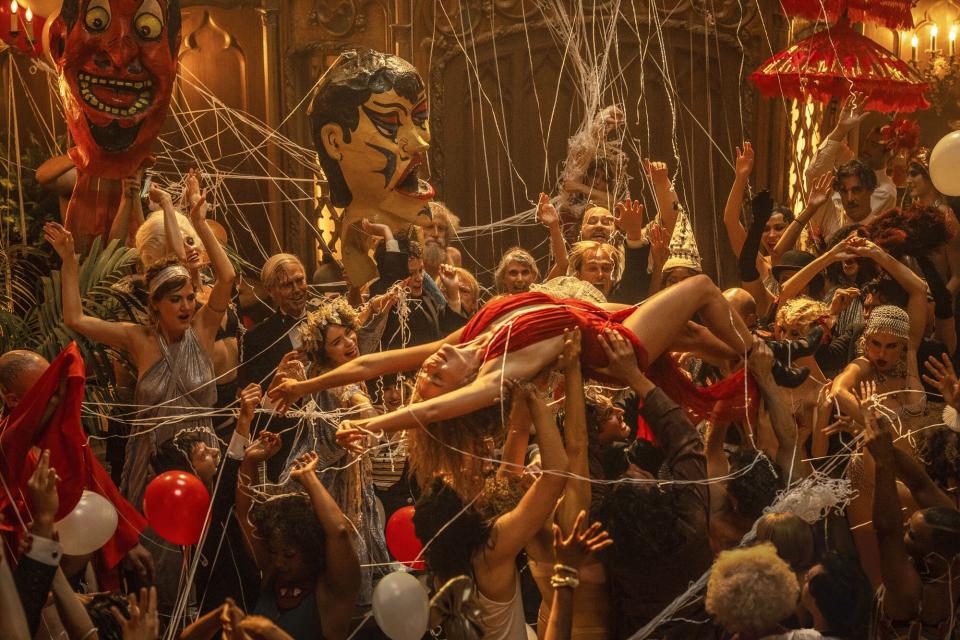Babylon review: Baby, it's way too much
Dotdash Meredith and Yahoo Inc. may earn commission or revenue on some items through the links below.
Hollywood was born in sin: a spangled palm-tree Sodom where pretty young things sell their souls for a role, and vice and venality run free. Or at least that's the myth we've built since silent pictures, and one that director Damien Chazelle seems desperate to convey in Babylon, his frantic, antic, and frankly exhausting ode to the birth of the business they call show.
It's also pretty old news to anyone who's read stuff like Kenneth Anger's Hollywood Babylon, the seminal scandal bible published nearly 60 years ago (and subsequently banned for a decade) that notoriously exposed — a lot would say exploited — many of the Golden Age stories retold here. That book, proudly operating on the far-out fringes of decency and accountability, never really pretended to be anything but what it was: a wild stew of slander and calamity as delicious as it was questionably true.
Chazelle, who became the youngest Best Director Oscar winner in history at 32 for La La Land, seems equally enamored of the industry's seamiest tales, while also coming at it like a gee-whiz kid; he needs it all to mean something. And he has at his disposal things that underground figures like Anger never did: a pile of money and movie stars, plus the high-gloss veneer of prestige filmmaking. It's still three turgid, clattering hours of nudity, depravity, and mislaid alligators, but also, you know, art.

Scott Garfield/Paramount Pictures Nellie LaRoy (Margot Robbie) is carried aloft during a big-scale Hollywood production in 'Babylon.'
Margot Robbie's Nellie LaRoy enters the frontier-town Los Angeles of 1926 like a hurricane, a beautiful would-be starlet with a brassy New Jersey squawk, a gambling problem, and a tendency to turn every room she enters into a bar brawl. Brad Pitt is Jack Conrad, a much-married matinee idol sliding into middle age and ever-deeper vats of alcohol. They're both dazzling to Manuel "Manny" Torres (Narcos: Mexico's Diego Calva), an aspiring producer with a Valentino face and a head full of stardust. All Manny wants is to be part of the magic of movies, whether that means wrangling an incontinent elephant for an unhinged house party or dragging strung-out talent from their beds (or whoever's bed they're in) to set by call time.
Like many of the major players here, he is Chazelle's creation: Most characters fall somewhere between composite and pure fiction, including Jean Smart's gossip-peddling power player Elinor St. John, a ringer for real-life rival columnists Hedda Hopper and Louella Parsons; Li Jun Li as a stand-in for Anna May Wong, the first major Chinese-American actress; and Jovan Adepo's gifted Black bandleader Sidney Palmer, whose career path echoes the early arcs of Louis Armstrong and Stepin Fetchit.
They and a cast of what easily seems like thousands spend most of the next 186 minutes in a whirl of decadence and bad decisions, careening from one hectic misadventure to the next. Cocaine piles up like table salt, and sex is universal currency; death comes casually and frequently, as a gut punch or a punchline. In one Tarantino-esque interlude, an inebriated Nelly wrestles a rattlesnake to the death in the desert; in another, she vomits shellfish at a cocktail party in an Exorcist spray. By the time Tobey Maguire arrives in the third act as a giggling, consumptive gangster, huffing a cocktail of brandy and ether, the phrase "Jazz Age Boogie Nights" feels almost too apropos.
But Boogie had a dramatic throughline, and something genuinely unsettling to say about the strange soul-bargaining of fame. Chazelle often steers his characters toward tragedy or anguish, without ever quite rooting his inscrutable thesis in anything real. (A brutal scene about blackface feels both as devastating as it's meant to be and oddly unearned.) There's also a sense that all this willful outrageousness just isn't his lane: The profanity is both relentless and numbing, and even the orgies look too clean. (Were people really waxing their personal bits circa Prohibition?)
It's all part of the film's panting need for provocation, along with its frequent, confounding anachronisms, from the hair and wardrobe down to the everyday slang. Yes, pre-Code Hollywood was a place for iconoclasts and outcasts, and in that sense could serve as a bubble of unlikely equality. But even a full-blown fantasy needs its own internal logic, a thing Babylon rarely gestures to or simply disregards completely. (What kind of unique challenges might a female director like the one Chazelle's real-life wife, Olivia Hamilton, portrays here so breezily have faced back in the day? You'll have to ask the ghost of Lois Weber. Race and class, too, don't seem to mean anything, until suddenly they do.)
The script still finds more than few bravura moments of absurd comedy, and the cast can't be faulted for committing. Pitt brings a boozy, unflappable charm and later, bewildered pathos; Robbie starts at 11 and never dials down. An acerbic Smart, vamping in a series of complicated hats, feels criminally underused, apart from one blistering speech she gives Pitt near the end. Even the cameos read like a red-carpet Rolodex on shuffle: Olivia Wilde, Eric Roberts, Katherine Waterston, Spike Jonze, Flea. Calva is naturally charismatic and lovely to look at, but the movie's supposed co-lead spends most of his time simply bearing witness — one more casualty in the frenzied, preposterous rush of Chazelle's Everything Hollywood All at Once. Grade: C–
Related content:

 Yahoo News
Yahoo News 
